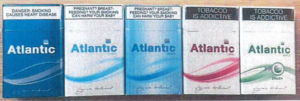By Ryan Tucker
On 26 May 2022, the South African Supreme Court of Appeal (“SCA”) held the trade mark ATLANTIC non-infringing of trade marks incorporating the word PACIFIC for identical goods, based on an application for infringement under section 34(1)(a) of the Trade Marks Act.
In Open Horizon Ltd v Carnilinx (Pty) Ltd [2022] ZASCA 75, Open Horizon (Appellant) was the owner of several trade marks incorporating the word PACIFIC for tobacco-related goods in class 34, the marks’ being:
1.
2.
3. PACIFIC STORM
4. PACIFIC MIST
Carnilinx (Respondent) uses the mark ATLANTIC on its packaging for identical goods (see below):
The question before the SCA was whether there were sufficient conceptual similarities between the marks to cause a likelihood of confusion to the relevant average consumer; the appellant’s having rightly conceded that there were no visual or phonetic similarities.
Although the SCA noted that, upon comparing the marks (the dominant elements of which were ATLANTIC and PACIFIC), both marks referred to an ocean, trade marks (generally) cannot create conceptual monopolies. Referring to Lucky Star, Sun International, La Chemise Lacoste, Cowbell, and Pear Technologies v EUIPO & Apple, the SCA found similarities in the reasoning of the latter, asserting that although the words ATLANTIC and PACIFIC conjure up the idea of an ocean indirectly, they indeed relate to two different ocean bodies located in two different sites in the world – such that they are unlikely to cause deception or confusion amongst a substantial number of consumers of class 34 products.
The SCA refused to entertain the Appellant’s cause of action based on unlawful competition for more technical reasons, based on the timing and foundation of its inclusion in the Appellant’s claim.
The Appellant would have done better to base its cause of action on unlawful competition and passing off at the outset, instead of trying to belatedly amend its application, once it realized that its section 34 claim was unlikely to succeed. It also needed to bring evidence supporting such a claim. The court did not find sufficient evidence in the appellant’s founding affidavit to sustain such a cause of action. In this regard, the court opined early on in its judgment (in paragraph [6]) that ‘passing off might have been a better horse to ride than trade mark in this case…’.
The SCA reaffirmed the cautions laid down by itself years earlier in Blue Lion and Payen Components, wherein it held that the requirement in passing off (a form of unlawful competition) that there be a likelihood of confusion or deception, amongst other restraints the common places on the action, is important in preventing the creation of impermissible monopolies. Therefore, coming full circle on the SCA’s refusing the Appellants appeal.






